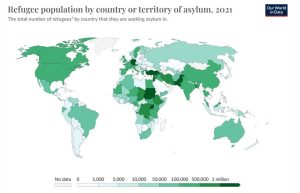Refugee burden not shared
A global index, run by the UN refugee agency UNHCR, that publicly ranks countries by how much they are doing to protect refugees could work as a lever increase refugee resettlement.
This is the suggestion of a leading academic in the field of Global Challenges, who says the index could contribute to creating a normative framework for how states should act in accepting people fleeing conflict or persecution.
Dr Matilde Rosina, of the UK’s Brunel University, says there needs to be a distinction here between migration generally and refugee numbers.
“While migration generally has been stable, refugee numbers have more than doubled in the past decade, going from almost 17 million in 2013 to 36 million in 2023,” Dr Rosina said.
“This has been primarily driven by protracted conflicts in Syria, Afghanistan and Ukraine. These have led millions to flee war, persecution and violence in their home countries,” she said.
 About seventy per cent of refugees are hosted in countries neighbouring where the people flee from. These are most often developing countries. In Lebanon, refugees comprise 15 per cent of the population.
About seventy per cent of refugees are hosted in countries neighbouring where the people flee from. These are most often developing countries. In Lebanon, refugees comprise 15 per cent of the population.
In contrast, in the UK the proportion stands at 0.5 per cent and in Japan at 0.01 per cent.
Dr Rosina said that while a few countries take most of the responsibility for refugees, many others shun cooperation.
“The result is that very few refugees are able to reach safety,” she said.
According to the UN, globally, only about 4 per cent of refugees in 2022 were able to access resettlement schemes and travel to a destination country safely and legally.
Many countries offer safe and legal routes to people in need of protection. Australia resettled around 20,000 people in 2023 through the Humanitarian Settlement Program.
“Scholars have long explored the possibility of a legally binding mechanism to ensure that refugee protection is responsibly shared. But such a system seems impossible in the current political climate,” Dr Rosina said.
“Despite this political difficulty, there could be ways to incentivise states to take more responsibility, without a legally binding system. One suggestion is to introduce a global, run by the UN refugee agency, that publicly ranks countries by how much they are doing to protect refugees.
“States contribute in different ways to refugee protection, including by hosting refugees, by creating legal pathways to protection and by providing funds to the UN refugee agency. An index that accounted for all of this would make it clearer which countries are doing more or less,” she said.
Read more here: Most countries do not take a fair share of refugees – here’s how we could incentivise them (theconversation.com)












